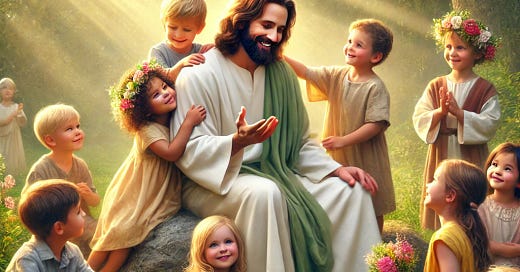Welcome to the Bible in a Year for 2025. Intro to this series and resource links available here, plus here’s how I’m approaching this year.
Scriptures for Today:
Reflection:
Jesus has set His sights on Jerusalem, after Peter’s declaration that He is the Messiah in chapter 8. In chapter 11, we find Jesus entering Jerusalem on Palm Sunday. Consider for a moment that Mark’s Gospel is only 16 chapters long and fully one-third of it is dedicated to the last week of Jesus’ life!
Blessing children (10:13-16) - The word Mark uses to describe Jesus’ reaction to the disciples shooing away the kids is striking: “indignant.” I wouldn’t want to be on the receiving end of that! Children were more of a bother and less idealized in the first century, so Jesus’ insistence on welcoming them would have surprised the disciples. Yet Jesus insists that children are as welcome as anyone in His presence.
First and last (10:31, 44) - The two stories of the rich young man and the posturing of the brothers James and John have a common thread: “many who are first will be last, and the last first.” The disciples amazement that the rich man who knew his Bible answers would stumble because of his wealth, and the brothers’ (prayer?) request that was stymied by Jesus both indicate that the kingdom simply doesn’t work by worldly rules. This is upside-down again—or rather “right-side up.”
Conflict in the Temple (11:15-20) - Jesus has already shown in the Gospel that He isn’t afraid of conflict. We see this surface again here as He defends the purpose of the temple: “My house will be called a house of prayer for all nations, but you have made it a den of robbers.” Verse 18 is telling: “The chief priests and the teachers of the law heard this and began looking for a way to kill him, for they feared him, because the whole crowd was amazed at his teaching.”
Great Commandment (12:28-34) - The “teachers of the law” are almost always lumped in with the Pharisees and present themselves as opponents of Jesus. Here we have a departure from that pattern. This man asks Jesus for the most important commandment. Significantly, Jesus gives two — Love for God (Deut. 6:4-5) and love for neighbor (Lev. 19:18). The man’s response is noteworthy, affirming that these two are “more important than all burnt offerings and sacrifices.” Worship and religious practices are important, but not as important as what ought to be their fruit—a life characterized by love of God and neighbor.
Questions:
Thinking about the disciples obstructing the children, who do you see being obstructed from coming to Jesus today?
How can you approach worship and devotional practices so that they cultivate love for God and neighbor and aren’t a rote ritual?
What else might the Holy Spirit be speaking with you about in the text today?
“But the seed falling on good soil refers to someone who hears the word and understands it. This is the one who produces a crop, yielding a hundred, sixty or thirty times what was sown.” (Matthew 13:23)
If you liked this post from Seeds of Faith, why not share it and/or subscribe?
All Scripture quotations, unless otherwise indicated, are taken from the Holy Bible, New International Version®, NIV®. Copyright ©1973, 1978, 1984, 2011 by Biblica, Inc.™ Used by permission of Zondervan. All rights reserved worldwide. www.zondervan.com The “NIV” and “New International Version” are trademarks registered in the United States Patent and Trademark Office by Biblica, Inc.™



